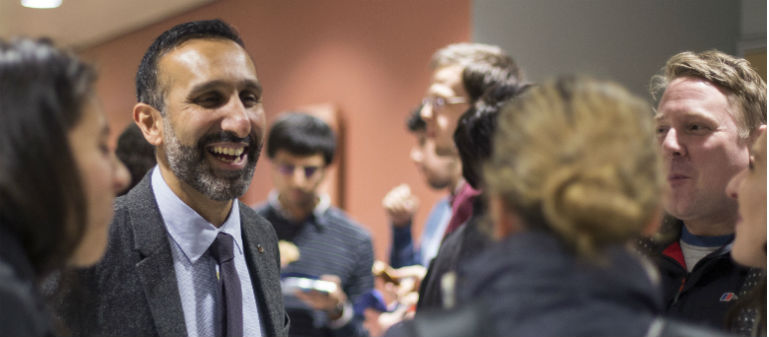
Queen Mary University of London in partnership with the Open University, offers a flexible route to a degree in Physics for students without standard entry qualifications via the OpenPlus scheme. This flexible route allows students to study a selected set of modules with the Open University on a part time basis. This may allow students to study alongside other commitments such as full time employment or family commitments. John Petrie graduated in 2015, and this is what he had to say about his experience of the Open Plus programme with us:

Overview
Students on the OpenPlus course typically spend two to three years studying a selected set of modules with the Open University. Upon successful completion of the prescribed Open University modules students will be able to enter stage two of their chosen degree programme with Queen Mary University of London. Degree courses available to OpenPlus Students include:
Physics | BSc (F300) or MSci (F303)
Astrophysics | BSc (F526) or MSci (F523)
Theoretical Physics | BSc (F340) or MSci (F323)
Physics with Particle Physics | BSc (F392) or MSci (F393)
After two (or three) years of full-time study with Queen Mary University of London students will graduate with a Bachelors (BSc) (or Masters (MSci) degree) from the University. The BSc course content covers a broad ranging physics curriculum providing an excellent pathway into a wide range of graduate level careers or the opportunity to continue your studies at postgraduate level.
The integrated Masters courses provide students with the opportunity to include additional physics material incorporating a major research project extending over the year. The course enables students to study Physics in greater depth and is tailored for those looking to enter an academic or industry led research career.
Course Content
During your part-time studies with the Open University you will complete the prescribed set of modules as detailed below. These modules will include studies of classical mechanics, waves, optics, electromagnetism, relativity and quantum physics. OpenPlus students will start with a mathematics module which will equip you with the fundamental building blocks for the higher physics modules.
| Code | Module | Level |
|---|---|---|
| MST124 | Essential Mathematics | OU level 1 |
| SS01 | Laboratory Skills for Science | Residential |
| S217 | Physics: from Classical to Quantum | OU level 2 |
| MS224 | Mathematical Methods | OU level 2 |
| SXPA288 | Practical Science: Physics and Astronomy | OU level 2 |
Studying with OpenPlus outside of the UK
OpenPlus is available in almost every country excluding (for regulatory reasons) China. Please email for confirmation that you can study your chosen subject.
With OpenPlus you start studying part time at home through supported learning with The Open University (OU). You may also be required to attend short residential schools in England.
You complete your degree by studying two years full time at your chosen partner university. See information for International students at Queen Mary. OpenPlus international students are subject to the same restrictions as our normal international students, please see here.
You can also study OpenPlus if you are a member of British armed forces with a BFPO address.
How to apply
There are no standard entry requirements for this route. Each application is considered on an individual basis.
You may wish to contact us first to discuss your application before applying and we will be happy to answer any questions you may have about the course.
Application Form
Applications are submitted direct to Queen Mary University of London by completing the following application form:
Application for OpenPlus Physics QMUL
To apply, please submit your completed application form to
Ms Enna Jazmina Vaca Ortiz
Recruitment Officer
Email: j.vaca-ortiz@qmul.ac.uk
Telephone: 0207 882 6958

